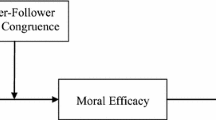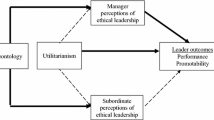Abstract
Research on work values shows that respectful leadership is highly desired by employees. On the applied side, however, the extant research does not offer many insights as to which concrete leadership behaviors are perceived by employees as indications of respectful leadership. Thus, to offer such insights, we collected and content analyzed employees’ narrations of encounters with respectful leadership (N 1 = 426). The coding process resulted in 19 categories of respectful leadership spanning 149 leadership behaviors. Furthermore, to also harness this comprehensive repertoire for quantitative organizational research, we undertook two more studies (N 2a = 228; N 2b = 412) to empirically derive a feasible item-based measurement of respectful leadership and assess its psychometric qualities. In these studies, we additionally investigated the relationships between respectful leadership as assessed with this new measurement and employees’ vertical and contextual followership as assessed via subordinates’ identification with their leaders, their appraisal respect for their leaders, their feeling of self-determination, and their job satisfaction.
Similar content being viewed by others
References
Anderson, E. (1993). Value in ethics and economics. Cambridge, MA: Harvard University Press.
Baard, P.P., Deci, E.L., & Ryan, R.M. (2004). Intrinsic need satisfaction: A motivational basis of performance and well-being in two work settings. Journal of Applied Social Psychology, 34(10), 2045–2068. doi:10.1111/j.1559-1816.2004.tb02690.x.
Bass, B.M., & Riggio, R.E.(2006). Transformational leadership (2nd ed.). Mahwah, NJ, US: Lawrence Erlbaum Associates Publishers.
Bettencourt, B.A., & Miller, N. (1996). Sex differences in aggression as a function of provocation: a meta-analysis. Psychological Bulletin, 119, 422–227. doi:10.1037/0033-2909.119.3.422.
Birch, T.H. (1993). Moral considerability and universal consideration. Environmental Ethics, 15, 313–332.
Boeckmann, R.J., & Tyler, T.R. (2002). Trust, respect and the psychology of political engagement. Journal of Applied Social Psychology, 32(10), 2067–2088. doi:10.1111/j.1559-1816.2002.tb02064.x.
Boezeman, E.J., & Ellemers, N. (2007). Volunteering for charity: Pride, respect, and the commitment of volunteers. The Journal of Applied Psychology, 92(3), 771–785. doi:10.1037/0021-9010.92.3.771.
Boezeman, E.J., & Ellemers, N. (2008a). Pride and respect in volunteers’ organizational commitment. European Journal of Social Psychology, 38(1), 159–172. doi:10.1002/ejsp.415.
Boezeman, E.J., & Ellemers, N. (2008b). Volunteer recruitment: The role of organizational support and anticipated respect in non-volunteers’ attraction to charitable volunteer organizations. The Journal of Applied Psychology, 93(5), 1013–1026. doi:10.1037/0021-9010.93.5.1013.
Branscombe, N.R., Spears, R., Ellemers, N., & Doosje, B. (2002). Intragroup and intergroup evaluation effects on group behavior. Personality and Social Psychology Bulletin, 28(6), 744–753. doi:10.1177/0146167202289004.
Brennan, R.L., & Prediger, D.J. (1981). Coefficient kappa: some uses and misuses, and alternatives. Educational and Psychological Measurement, 41, 687–699. doi:10.1177/001316448104100307.
Chemers, M.M. (2003). Leader effectiveness: An integrative review. In M. A. Hogg & R. S. Tindale (Eds.), Blackwell handbook of social psychology: Group processes (pp. 376-399). Malden, MA: Blackwell Publisher.
Chhokar, J.S., Brodbeck, F.C., & House, R.J. (Eds.).(2007). Culture and leadership across the world: The GLOBE book of in-depth studies of 25 societies. Mahwah, NJ: LEA Publishers.
Cohen, D., Nisbett, R.E., Bowdle, B.F., & Schwarz, N. (1996). Insult, aggression, and the southern culture of honor: an “experimental ethnography”. Journal of Personality and Social Psychology, 70, 945–960. doi:10.1037/0022-3514.70.5.945.
De Cremer, D. (2003). Noneconomic motives predicting cooperation in public good dilemmas: The effect of received respect on contributions. Social Justice Research, 16(4), 367–377. doi:10.1023/A:1026361632114.
De Cremer, D., & Tyler, T.(2005). A matter of intragroup status: The importance of respect for the viablity of groups. In M. Thomas-Hunt (Ed.), Research on managing groups and teams (Vol. 7, pp. 1-21). Greenwich. CT: Elsevier Science Press.
Deci, E.L., & Ryan, R.M. (2000). The “what” and “why” of goal pursuits: Human needs and the self-determination of behavior. Psychological Inquiry, 11, 227–268. doi:10.1207/S15327965PLI1104_01.
Dillon, R.S: 2003, ‹Respect’, The Stanford Encyclopedia of Philosophy Fall 2003 Edition. Retrieved October 05, 2004, from http://plato.stanford.edu/archives/fall2003/entries/respect/.
Dillon, R. S. (2007). Respect: A philosophical perspective. Gruppendynamik und Organisationsberatung, 38(2), 201-212.
Downie, R.S., & Telfer, E.(1969). Respect for Persons. London: George Allen&Unwin.
Ellingsen, T., & Johannesson, M. (2007). Paying respect. The Journal of Economic Perspectives, 21(4), 135–149. doi:10.1257/jep.21.4.135.
Frankena, W.K. (1986). The ethics of respect for persons. Philosophical Topics, 14, 149–167.
Gagné, M., & Deci, E.L. (2005). Self-determination theory and work motivation. Journal of Organizational Behavior, 26, 331–362. doi:10.1002/job.322.
Goldstein, D.K., & Rockart, J.F. (1984). An examination of work-related correlates of job satisfaction in programmer/analysts. MIS Quarterly, 8(2), 103–115. doi:10.2307/249347.
Graen, G.B., & Uhl-Bien, M. (1995). Relationship-based approach to leadership: Development of leader-member exchange (LMX) theorie of leadership over 25 years: Applying a multi-level multi-domain approach. The Leadership Quarterly, 6, 219–247. doi:10.1016/1048-9843(95)90036-5.
Graf, M. M. and N. van Quaquebeke: 2007, Respected Leaders: A Question of Accepted Influence, Personal Power/Legitimacy, and Personal Identification. Paper Presented at the 13th European Congress on Work and Organizational Psychology, Stockholm
Hill, T.E., Jr. (1998). Respect for persons. In E. Craig (Ed.), Routledge Encyclopedia of Philosophy. London: Routledge.
Hofstede, G.H. (1991). Cultures and organizations: Software of the mind. London, New York: McGraw-Hill.
House, R.J., Hanges, P.J., Javidan, M., Dorfman, P., & Gupta, V.(2004). Culture, leadership, and organizations: The GLOBE study of 62 societies. Thousand Oaks, CA: Sage Publications.
Judge, T.A., Piccolo, R.F., & Ilies, R. (2004). The forgotten ones? The validity of consideration and initiating structure in leadership research. The Journal of Applied Psychology, 89(1), 36–51. doi:10.1037/0021-9010.89.1.36.
Kant, I.: 1788, Critic der practischen Vernunft. Riga Johann Friedrich Hartknoch
Kelman, H.C. (1958). Compliance, identification, and internalization: Three processes of attitude change. The Journal of Conflict Resolution, 2, 51–60. doi:10.1177/002200275800200106.
Kunin, T. (1955). The Construction of a New Type of Attitude Measure. Personal Psychology: A Journal of Applied Research, 8, 65-77.
La Guardia, J.G., Ryan, R.M., Couchman, C.E., & Deci, E.L. (2000). Within-person variation in security of attachment: A self-determination theory perspective on attachment, need fulfillment, and well-being. Journal of Personality and Social Psychology, 79, 367–384. doi:10.1037/0022-3514.79.3.367.
Lind, E.A., & Tyler, T.R.(1988). The social psychology of procedural justice. New York: Plenum.
Mael, F.A., & Ashforth, B.E. (1992). Alumni and their alma mater: A partial test of the reformulated model of organizational identification. Journal of Organizational Behavior, 13, 103–123. doi:10.1002/job.4030130202.
Margalit, A. (1998). The decent society (N. Goldblum, Trans.). Cambridge, MA: Harvard University Press.
Mason, E.S. (1994). Work values: A gender comparison and implications for practice. Psychological Reports, 74(2), 415–418.
Mayring, P.: 2000, ‹Qualitative Content Analysis’, Forum Qualitative Sozial Forschung 1(2). http://www.qualitative-research.net/index.php/fqs/article/view/1089/2385
Miller, D.T. (2001). Disrespect and the experience of injustice. Annual Review of Psychology, 52, 527–552. doi:10.1146/annurev.psych.52.1.527.
Organ, D.W., Podsakoff, P.M., & MacKenzie, S.B.(2006). Organizational Citizenship Behavior: Its nature, antecedents, and consequences. Thousand Oaks: Sage Publications.
Pettit, P. (1989). Consequentialism and respect for persons. Ethics, 100, 116–126. doi:10.1086/293149.
Podsakoff, P.M., Podsakoff, N.P., MacKenzie, S.B., & Lee, J.-Y. (2003). Common method biases in behavioral research: A critical review of the literature and recommended remedies. The Journal of Applied Psychology, 88(5), 879–903. doi:10.1037/0021-9010.88.5.879.
Rawls, J. (1999). A theory of justice. Cambridge, MA: Harvard University Press.
Raz, J. (2001). Value, respect and attachment (Vol. 4). Cambridge: Cambridge University Press.
Sennett, R. (2003). Respect in a world of inequality (1st ed.). New York: W.W. Norton.
Shamir, B., House, R.J., & Arthur, M.B. (1993). The motivational effects of charismatic leadership: A self-concept-based theory. Organization Science, 4, 577–594. doi:10.1287/orsc.4.4.577.
Simon, B. (2007). Respect, equality, and power: A social psychological perspective. Gruppendynamik und Organisationsberatung, 38(3), 309–326. doi:10.1007/s11612-007-0027-2.
Simon, B., Lücken, M., & Stürmer, S. (2006). The added value of respect: Reaching across inequality. The British Journal of Social Psychology, 45(3), 535–546. doi:10.1348/014466605X57637.
Simon, B., & Stürmer, S. (2003). Respect for group members: Intragroup determinants of collective identification and group-serving behavior. Personality and Social Psychology Bulletin, 29(2), 183–193. doi:10.1177/0146167202239043.
Simon, B., & Stürmer, S. (2005). In search of the active ingredient of respect: A closer look at the role of acceptance. European Journal of Social Psychology, 35(6), 809–818. doi:10.1002/ejsp.272.
Sleebos, E., Ellemers, N., & De Gilder, D. (2007). Explaining the motivational forces of (dis)respect: How self-focused and group-focused concerns can result in the display of group-serving efforts. Gruppendynamik und Organisationsberatung, 38(3), 327–342. doi:10.1007/s11612-007-0028-1.
Smith, H.J., Tyler, T.R., Huo, Y.J., Ortiz, D.J., & Lind, E.A. (1998). The self-relevant implications of the group-value model: Group membership, self-worth, and treatment quality. Journal of Experimental Social Psychology, 34(5), 470–493. doi:10.1006/jesp.1998.1360.
Spears, R., Ellemers, N., & Doosje, B. (2005). Let me count the ways in which I respect thee: Does competence compensate or compromise lack of liking from the group? European Journal of Social Psychology, 35(2), 263–279. doi:10.1002/ejsp.248.
Strauss, A. L., & Corbin, J. M. (1998). Basics of qualitative research: Techniques and procedures for developing grounded theory (2nd edition). Sage: London.
Thompson, W.D., & Walter, S.D. (1988). A reappraisal of the kappa coefficient. Journal of Clinical Epidemiology, 41, 949–958. doi:10.1016/0895-4356(88)90031-5.
Tyler, T.R., & Blader, S.L.(2000). Cooperation in groups: Procedural justice, social identity, and behavioral engagement. Philadelphia: Psychology press.
Tyler, T.R., & Blader, S.L. (2003). The group engagement model: Procedural justice, social identity, and cooperative behavior. Personality and Social Psychology Review, 7(4), 349–361. doi:10.1207/S15327957PSPR0704_07.
Tyler, T.R., Boeckmann, R.J., Smith, H.J., & Huo, Y.J.(1997). Social justice in a diverse society. Boulder, CO: Westview.
Tyler, T.R., & Lind, E.A.(1992). A relational model of authority in groups. In M. P. Zanna (Ed.), Advances in Experimental Social Psychology (Vol. 25, pp. 115-191). New York: Academic Press.
van Dick, R., Wagner, U., Stellmacher, J., & Christ, O. (2004). The utility of a broader conceptualization of organizational identification: Which aspects really matter? Journal of Occupational and Organizational Psychology, 77(2), 171–191. doi:10.1348/096317904774202135.
van Knippenberg, B., & van Knippenberg, D.(2003). Leadership, identy and influence: Relational concerns in the use of influence tactics. In D. van Knippenberg & M. A. Hogg (Eds.), Leadership and power: Identity processes in groups and organizations (pp. 123-137). London: Sage.
van Knippenberg, D., van Knippenberg, B., De Cremer, D., & Hogg, M.A. (2004). Leadership, self, and identity: A review and research agenda. The Leadership Quarterly, 15, 825–856. doi:10.1016/j.leaqua.2004.09.002.
van Quaquebeke, N. and F. C. Brodbeck: 2008, ‹Entwicklung und erste Validierung zweier Instrumente zur Erfassung von Führungskräfte-Kategorisierung im deutschsprachigen Raum’, Zeitschrift für Arbeits- und Organisationspsychologie 52(2), 70–80. Development and first validation of two scales to measure leader categorization in German-speaking countries. doi:10.1026/0932-4089.52.2.70
van Quaquebeke, N., Henrich, D.C., & Eckloff, T. (2007). “It’s not tolerance I’m asking for, it’s respect!” A conceptual framework to differentiate between tolerance, acceptance and respect. Gruppendynamik und Organisationsberatung, 38(2), 185–200. doi:10.1007/s11612-007-0015-6.
van Quaquebeke, N., S. Zenker and T. Eckloff: 2008, ‹Find Out How Much it Means to Me! The Importance of Interpersonal Respect in Work Values Compared to Perceived Organizational Practices’, Journal of Business Ethics (online first). doi:10.1007/s10551-008-0008-6
Yukl, G.A., & Van Fleet, D.D.(1992). Theory and research on leadership in organizations. In M. D. Dunnette & L. M. Hough (Eds.), Handbook of industrial and organizational psychology (5th ed., Vol. 1, pp. 147-198). Palo Alto, CA: Consulting Psychologists Press.
Author information
Authors and Affiliations
Corresponding author
Rights and permissions
About this article
Cite this article
van Quaquebeke, N., Eckloff, T. Defining Respectful Leadership: What It Is, How It Can Be Measured, and Another Glimpse at What It Is Related to. J Bus Ethics 91, 343–358 (2010). https://doi.org/10.1007/s10551-009-0087-z
Received:
Accepted:
Published:
Issue Date:
DOI: https://doi.org/10.1007/s10551-009-0087-z




